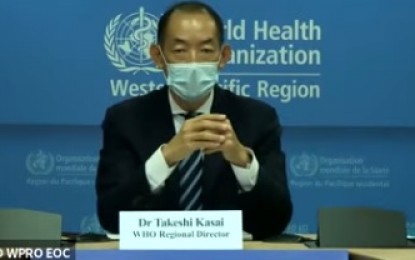
World Health Organization-Western Pacific Regional Director Takeshi Kasai
MANILA – An official of the World Health Organization (WHO) has lauded the Philippines' efforts to improve its health care capacity and curb the spread of the coronavirus disease 2019 (Covid-19).
“The Philippine government has been putting a lot of effort in continuously improving their capacity. I have seen also they're upgrading their health services, increasing the number of health care facilities, beds, and also establishing intermediate facilities. So far, we haven’t really seen (if) the number (of cases) overwhelm health care facilities,” WHO-Western Pacific Regional Director Takeshi Kasai said in a virtual media briefing on Tuesday.
Citing that the disease and the efforts to stop its spread have impacted the economy, Kasai noted that the Philippine government is continuously improving its testing capacity and contact tracing to protect the poor who need to return to work.
"I think it's very important for the government to continue to improve this capacity. I think it’s very important to encourage people to maintain their healthy behavior. It’s important for everybody to voluntarily do very similar things (minimum health standards) in order to suppress and not overwhelm health care (facilities) in this country,” he said.
The Philippines has the highest number of confirmed Covid-19 cases in Southeast Asia.
As of 4 p.m. Tuesday, it has logged a total of 169,213 cases – 53,665 are active ones, 112,861 have recovered, and 2,687 have died.
Kasai said the number of Covid-19 cases is "not important" so long as this does not overwhelm the country’s health care facilities.
“(The) Philippines is a country that introduced lockdown in the very early stage of this pandemic. I’m sure it prevented a significant number of infections, and, hence the number of people dying from there, and it prevented the health care (facilities) from being overwhelmed,” he said.
Due to the pandemic, the Philippines imposed strict community quarantines in mid-March, temporarily closing businesses and public transport, and upending the economy and lives of Filipinos.
"I think it's very important for everybody to voluntarily do very similar things so that we can continue to suppress (the rise of infections) and not overwhelm the health care facility in this country," Kasai said.
He said governments should redouble their efforts to protect the vulnerable, noting a "resurgence" of the disease.
"We believe it's a signal that we've entered a new phase of the pandemic in the Asia Pacific," Kasai said.
Authorities have constantly reminded the public of the minimum health protocols, such as wearing face masks, washing hands, and observing physical distancing to curb the spread of the disease.
Some 1,956,496 Covid-19 tests have also been conducted nationwide since the start of the pandemic early this year until August 17.
The government is likewise ramping up the number of bed capacity in hospitals, especially in Metro Manila where the majority of Covid-19 cases are logged.
As of Monday, the Department of Health said it has 19,000 total bed capacity dedicated to Covid-19 patients.
Occupied are about 51 percent of 1,700 intensive care unit beds; 47 percent of 12,300 isolation beds; and 53 percent of 5,000 ward beds.
About 28 percent of 2,200 ventilators are in use. (PNA)
